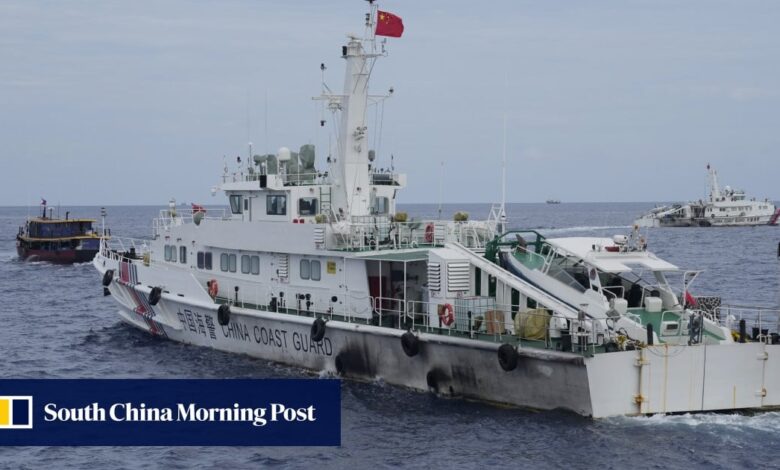South China Sea: Philippines doesn’t want war but will stand up to China’s ‘bullying’, defence chief says

[ad_1]
But blame for any incident, whether accidental or otherwise, would lie with China “squarely on their shoulders”, he warned.
In the latest episode in the weeks-long upsurge of tensions, Manila this week said its personnel removed a Chinese floating barrier near the Scarborough Shoal – another land feature in the South China Sea – calling it a violation of international law and a hazard to navigation.
China gained control of the shoal in 2012 after a stand-off with the Philippines, and the area has seen bouts of high-tension encounters over sovereignty and fishing rights for years.
The Chinese coastguard late on Wednesday disputed the Philippine version of the events, stating they had retrieved the barrier last Saturday after deploying it in response to a Philippine vessel’s illegal entry into the area a day prior.
A back-and-forth between the two countries over the row continued, with a spokesman for China’s foreign ministry dismissing Manila’s actions, and emphasising that the Scarborough Shoal – known as Huangyan Island in China – was in fact Chinese territory.
“This so-called action by the Philippine side is purely a farce for its own amazement,” Wang Wenbin said on Wednesday. Chinese observers have said the entry of Philippine fishing vessels in the Scarborough Shoal lagoon would not be allowed as it endanger “China’s control” of the area.
How Beijing is using ‘fishing militia’ to assert its claims in the South China Sea
How Beijing is using ‘fishing militia’ to assert its claims in the South China Sea
China’s actions at Scarborough Shoal “not only impedes the rights and livelihoods of our Filipino fishermen but also disrupts the prevailing atmosphere of regional peace and collaboration”, they said in the statement.
Defence Secretary Teodoro appeared to confirm the proposal, telling CNN that further “air and naval assets” had been ordered as part of Philippine President Ferdinand Marcos Jnr’s commitment to boost the country’s defence and monitoring capabilities in the South China Sea.
“The use of the word ‘bully’ with regard to China’s maritime actions has been circulating frequently these days within Manila’s establishment and even publicly towards the media, so this characterisation [by Teodoro] is not surprising,” said Collin Koh, a research fellow at the S. Rajaratnam School of International Studies in Singapore.

Beijing’s nine-dash line claim to around 90 per cent of the South China Sea overlaps with the exclusive economic zones (EEZ) of several Southeast Asian nations, including the Philippines.
Regarding the recent row, Koh said the Philippines also appeared confident it had the backing of international law for its actions.
“[Manila] will qualify to say that it did not do more than a routine exercise of its sovereign right in removing that barrier and carrying a resupply mission to the outpost within its EEZ,” he said.
The dispute showed there were “irreconcilable differences” between the two countries, as “both parties have their own interpretation of the international law”, Koh added.
Apart from the recent episodes at Second Thomas and Scarborough shoals, there have been other minor incidents involving both nations over the last year.
In February, the Philippines accused China of employing a “military-grade” laser beam to obstruct a resupply mission to the Second Thomas Shoal.
Standing up doesn’t mean really going to war with China, heavens no. But we have to stand our ground when our ground is intruded into
In the interview, defence chief Teodoro told CNN that diplomacy would be the best way forward if Beijing complied with international law.
The Philippines, he said, had “no choice” but to stand up to China because otherwise “we lose our identity and integrity as a nation”, but conflict was not the preferred outcome.
“Standing up doesn’t mean really going to war with China, heavens no. We don’t want that,” he said. “But we have to stand our ground when our ground is intruded into.”
Beijing says its territorial claims over disputed shoals and other features in the South China Sea – based on so-called historic rights – allow it to draw straight baselines to create a vast coastal jurisdiction that makes up over 80 per cent of the sea.
Claimants such as the Philippines, Malaysia and Vietnam, as well as a majority of Asean countries, hold that all maritime claims must be based on the 1982 United Nations Convention on the Law of the Sea (Unclos). They hold that China’s expansive claims are beyond the lawful limits of Unclos.
China – which is party to Unclos – rejects this interpretation of the law and also does not recognise a 2016 arbitral ruling in a case brought by Manila that was in favour of the Southeast Asian nation’s claims.
[ad_2]
Source link

